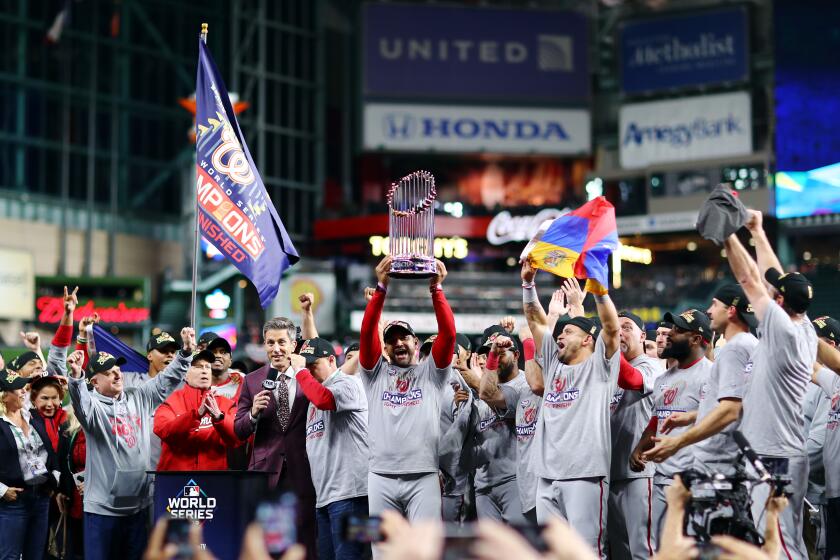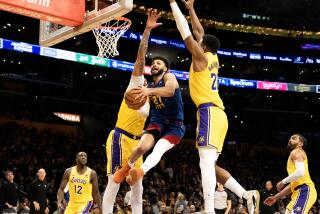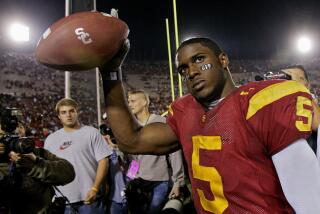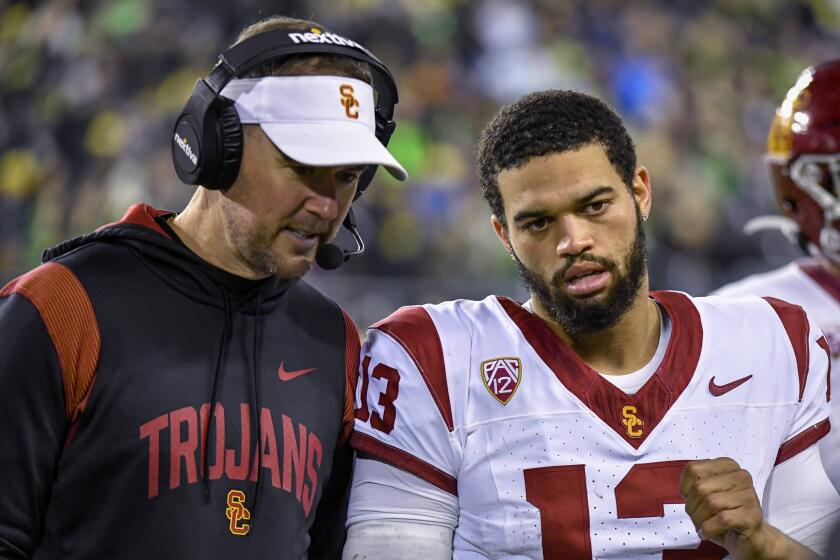Column: Should pro teams visit the White House with the country so divided?
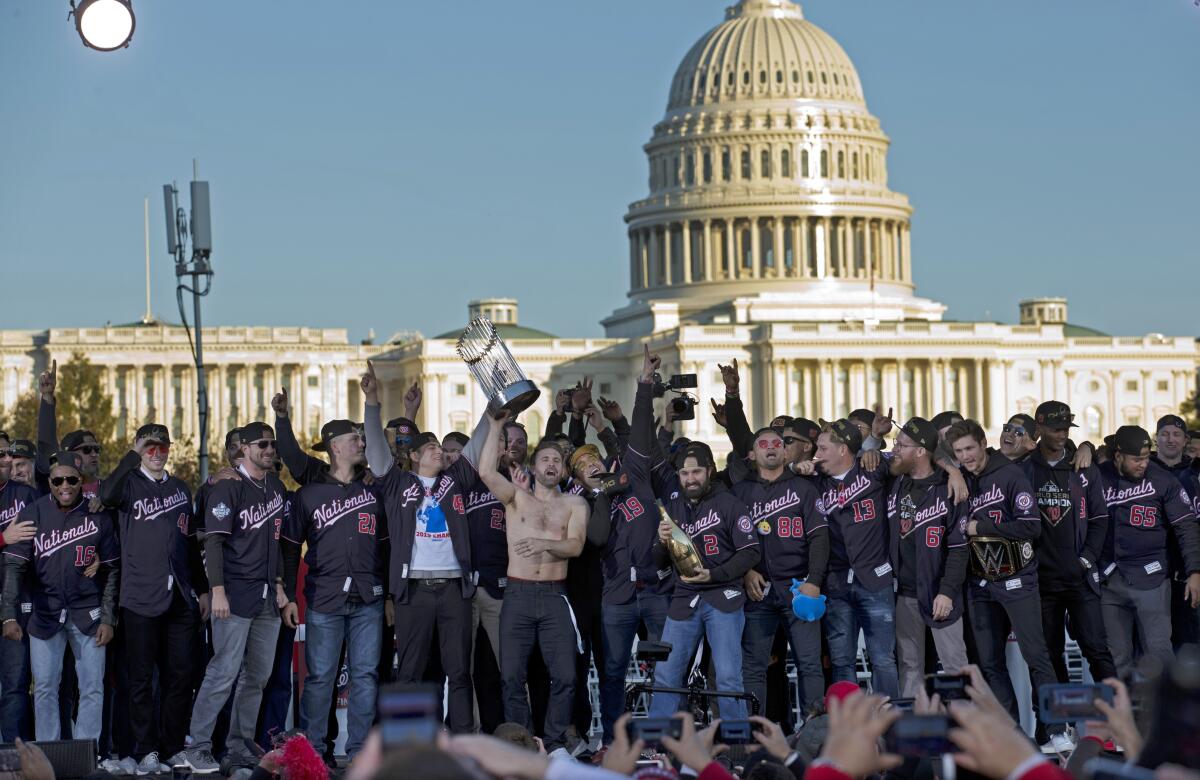
They say history repeats itself and it’s hard to argue when looking at the events that have unfolded in this country over the past week.
The Washington Nationals won the World Series and are scheduled to meet President Trump on Monday. The first time the Washington Nationals went to meet the president was in August 1865 when they— along with the Brooklyn Atlantics — met President Andrew Johnson, in what is widely believed to be the first time a sports team was invited to the White House.
Johnson ascended to the highest office following a president from Illinois. Trump, the same. Johnson would go on to become the first United States president to be impeached, avoiding removal by the Senate. Trump, as I’m sure you are well aware, has similar difficulties in the House and a Senate that is unlikely to remove him.
Trippy, right?
The only wrinkle is Johnson, along with fellow impeachment-facing presidents Richard Nixon and Bill Clinton, dealt with bipartisan chastisement. In the case of President Trump, not one of the 194 House Republicans who voted on Thursday’s resolution to formalize the impeachment investigation voted “yes.” It’s a clear snapshot of how the country is perhaps just as divided politically as it was when Johnson became president shortly after the conclusion of the Civil War.
Sometimes you’re the buzz saw. Sometimes you run into it. The Dodgers had a great season, but the World Series champion Nationals are a team that wasn’t a favorite.
All of which leads to this question: When it’s all said and done, will the tradition survive?
Over the course of the 154 years between the Nationals’ first visit and the pending one, teams would accept White House invitations if for no other reason than out of respect for the office of the presidency.
Yes, we’ve always had players skip the celebration for a variety of reasons, but for the most part those reasons did not overshadow the occasion. That no longer feels true. Who declines the White House invitation — and more importantly, why — has become far more compelling than awkward photo ops.
From Boston Red Sox manager Alex Cora choosing not to attend the celebration because of how the Trump administration handled Hurricane Maria relief to Puerto Rico to U.S. Women’s soccer star midfielder Megan Rapinoe saying she’s “not going to the [expletive] White House” in protest, we are inching closer to the point in which accepting an invite from the president is conflated with accepting the president.
It’s an unfortunate but understandable development. Historically sports was one of those aspects in American life in which fans from various walks of life could find common ground, if only for nine innings or four quarters. But now not even the euphoria of winning a championship appears powerful enough to overcome the divisive sludge that is oozing out of our smartphones, televisions and radios.
It’s hard to paint Nationals relief pitcher Sean Doolittle as anything other than a decent person. He volunteers to help displaced military veterans, he hosted Thanksgiving dinner for Syrian refugees and he listens to his mom and dad, telling the New York Times “when I was a kid, I remember my parents would say, ‘Baseball is what you do, but that’s not who you are’ — like that might be my job, but that’s not the end-all, be-all.”
When President Trump tried to characterize his infamous “grab [women] by the ... “ remark as locker room talk, Doolittle took to Twitter to say, “As an athlete, I’ve been in locker rooms my entire adult life and uh, that’s not locker room talk.”
Yet despite these and other examples of his humanitarianism, his choosing to not visit the White House in protest of Trump’s rhetoric is going to place him in a bad light for a lot of people. They will view his actions as disrespectful, even unpatriotic. Maybe Trump will call him a son of a bitch the way he referred to NFL players who were protesting police corruption as such.
Howie Kendrick sparks Nationals’ comeback over Astros to win first World Series in franchise history
The Washington Nationals beat the Houston Astros 6-2 in Game 7 of the World Series. Howie Kendrick’s home run in the seventh inning sparked the Nationals’ come-from-behind rally.
Again, this isn’t the first time an athlete has declined such an invitation in protest. But this is the first time in recent memory that the lines being drawn are authored by the president himself, thus posing a dilemma for his supporters — are you with me or with them?
And now that this precedent has been set, will we be able to recover? Regardless of what happens with the impeachment inquiry, the partisan hostility is requiring athletes, teams and universities to think beyond travel logistics with each White House invite. Now they must consider the message being sent.
Once upon a time the message was about respecting the office. Increasingly it has become about the person in the office. Today team’s are skipping the visit because they don’t like Trump. Tomorrow perhaps teams skip because they don’t like the policies or rhetoric of the new guy. … or gal.
Remember there was a time in which the White House Correspondents’ Dinner was the hottest ticket in town. Three years of poisonous rhetoric and hostility later, it is barely an afterthought. That is the same trajectory the sports invitation is headed. It is becoming a PR nightmare for the White House and more trouble than what it’s worth for teams with vocal athletes — and that was before the impeachment inquiry.
Face it, Doolittle’s absence for political reasons is the new normal and so for a segment of people looking for an escape, they may want to try another route. This, sadly, leads to a dead end.
More to Read
Go beyond the scoreboard
Get the latest on L.A.'s teams in the daily Sports Report newsletter.
You may occasionally receive promotional content from the Los Angeles Times.
